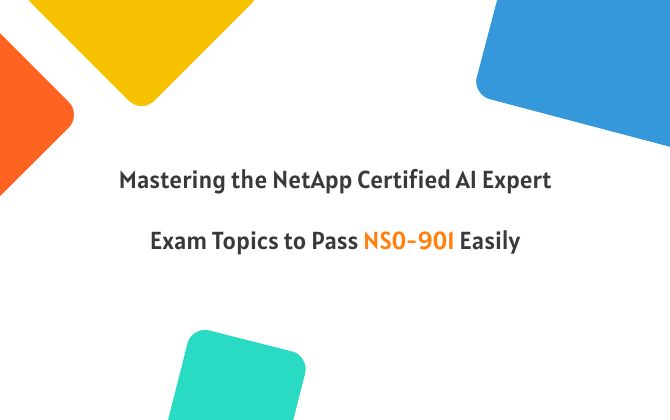Ready to elevate your career in Artificial Intelligence? The NetApp Certified AI Expert NS0-901 exam offers a clear path to validate your specialized skills in designing and managing AI infrastructures with NetApp solutions. This isn't just another certification; it's a testament to your ability to navigate the complexities of AI concepts, software, and hardware architectures, and to overcome common deployment challenges. By mastering the core topics of the NS0-901, you'll not only boost your professional credibility but also gain the confidence to contribute significantly to cutting-edge AI initiatives.

Before diving into the technical details, a solid understanding of fundamental AI concepts is a must. This domain is your starting point and sets the stage for the rest of the exam.
Key Focus: Don't just memorize definitions. Understand the "why." For instance, why are digital twins so valuable in manufacturing? What makes supervised learning different from unsupervised learning in a practical scenario?
Actionable Tip: Create a glossary of terms. Use flashcards to differentiate between key concepts like training vs. inferencing, or AI vs. Machine Learning vs. Deep Learning. Think of real-world examples for each to solidify your understanding. Pay close attention to how AI is used across various industries.
This is the largest domain, and for good reason. It covers the entire journey of an AI project, from data preparation to model deployment. A deep understanding here is crucial for success.
Key Focus: Master the differences between predictive and generative AI. This is a major topic, especially with the rise of Large Language Models (LLMs). Be prepared to discuss concepts like hallucinations and the role of Retrieval Augmented Generation (RAG) and fine-tuning.
Actionable Tip: Map out the AI lifecycle on a whiteboard. From data aggregation and cleansing (NetApp's BlueXP Classification, XCP, CopySync) to model building, fine-tuning, and inferencing, visualize how each step flows into the next. Understand the specific NetApp tools used at each stage.
Beyond the data and models, you need to know the software tools and platforms that enable AI at scale. This domain tests your knowledge of the MLOps and LLMOps ecosystems.
Key Focus: You are not expected to be a master of every single platform, but you should know the high-level purpose of each. For example, what is the role of Kubernetes and Trident in executing AI workloads at scale? How does NetApp's DataOps Toolkit streamline workflows for data scientists?
Actionable Tip: Research the key features of the major MLOps platforms like AWS SageMaker and Google VertexAI. Understand how NetApp's tools, particularly the BlueXP GenAI Toolkit and Workload Factory, integrate into and enhance these environments. Practice explaining the difference between a Jupyter notebook (experimental) and a pipeline (production).
An AI expert must understand the hardware foundation. This domain connects the software and data to the physical infrastructure.
Key Focus: Pay close attention to the role of different hardware components. Why are GPUs (like Nvidia's) so critical for deep learning? What is the difference between Ethernet and Infiniband networks, and why does that matter for AI workloads?
Actionable Tip: Create a simple chart comparing NetApp's storage architectures (C-Series, A-Series, EF-Series, StorageGRID) and their ideal use cases. Map protocols (file vs. object vs. parallel file systems) to specific workloads. Understand the purpose of architectures like SuperPOD, BasePod, and OVX, and which NetApp products fit into each.
This domain is about practical application and troubleshooting. It takes all the previous knowledge and puts it into the context of real-world challenges.
Key Focus: This section tests your ability to think like an architect. How would you size storage for a large training workload? What NetApp features would you use to ensure data is traceable and recoverable? How do you secure data from threats like ransomware?
Actionable Tip: Think in terms of solutions. For each challenge (e.g., maximizing performance, optimizing cost, securing data), list the specific NetApp products or features that provide the solution. For example, for maximizing performance, the answer is about keeping GPUs utilized, which is a key benefit of NetApp's high-performance storage. For cost optimization, think of FabricPool and FlexCache.
Get Hands-On Experience: The exam is for professionals with 6-12 months of experience. The best way to prepare is to get hands-on with NetApp products and AI workloads. If you don't have access to a lab, utilize NetApp's training resources and free trials where available.
Use NetApp's Official Resources: Review the official exam guide and any recommended training courses from NetApp. These materials are your most direct path to understanding the expected knowledge base.
Join the Community: Engage with forums, study groups, and NetApp's communities. Discussing topics with others can clarify difficult concepts and expose you to different perspectives.
Practice as much as possible: While there may not be an abundance of practice tests, you can create your own by reviewing the exam topics and quizzing yourself on the key concepts for each.
By following this strategic approach and dedicating time to each domain, you'll not only prepare effectively for the NS0-901 exam but also build the foundational expertise to excel as a NetApp Certified AI Expert. The certification is more than a title - it's a validation of your readiness to contribute to the future of AI.